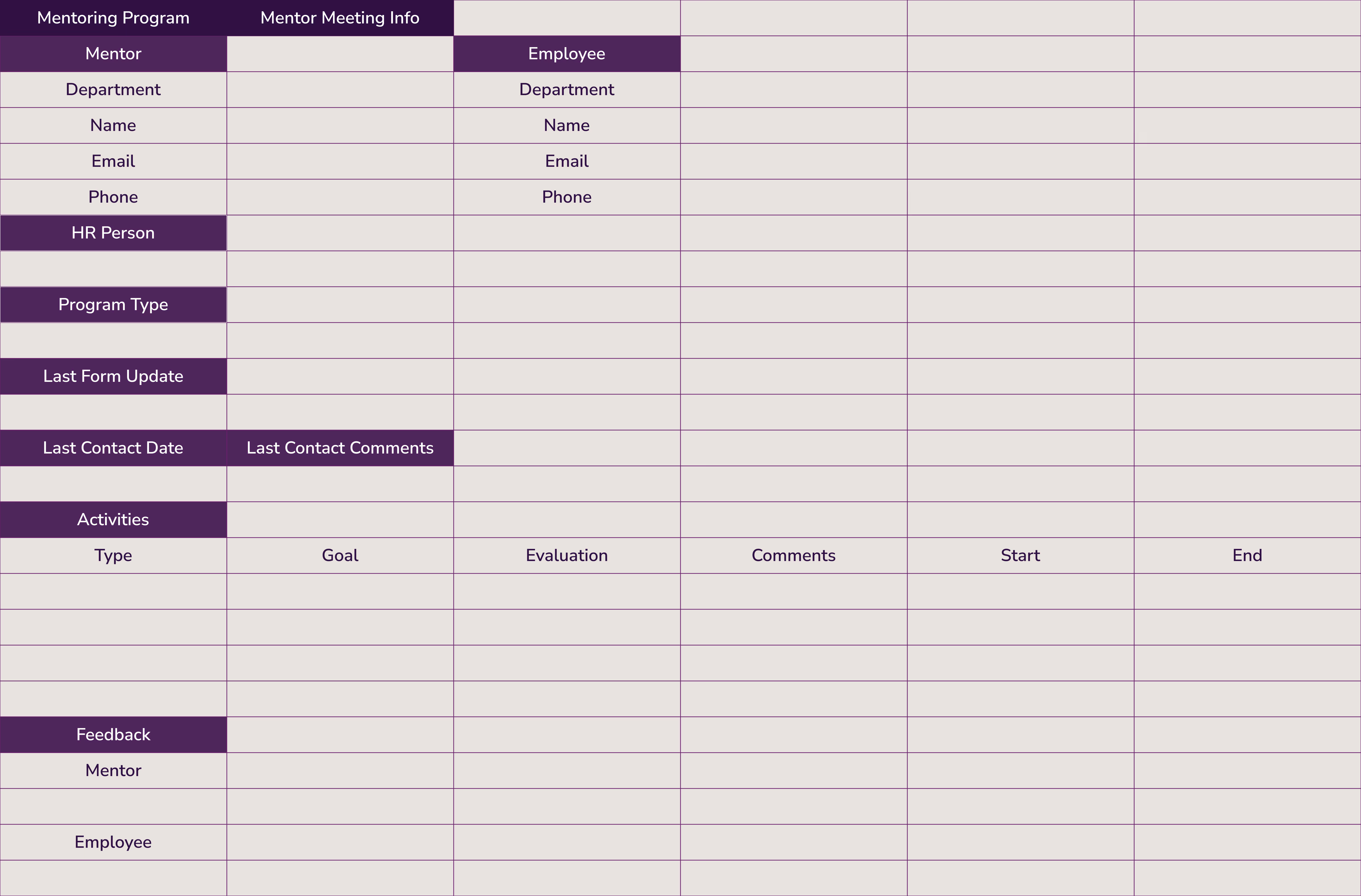Mentorship Program
In many ways, mentorship programs provide the best of both worlds. They are a popular and effective type of employee development program that matches the worker with an expert from their industry. A mentor typically has years of )experience in applying business concepts according to the company’s standards. At the same time, a good mentor will understand the basics of upskilling and advising along the lines of a coach. The key to a successful mentorship program is to first identify precisely which skills require development on an individual basis.
<< Download FREE Mentorship Program Template >>
Coaching vs. Mentoring
‘Coaching’ and ‘mentoring’ are often defined in the same way. However, there are some key differences.
Coaches
Coaches are experts who are external to an organization and are hired to implement learning and development programs for a contracted period. Their official profession is coaching, although they often have worked in some other professional capacity in the past. Workplace coaches typically have certification from an organization such as the ICF.
The advantage of using a coach is that they have experience in advising career development in a wide range of industries, compared to the narrower focus of a mentor, who often has more specific experience. For this reason, coaches are preferred for resolving “big picture” issues like reducing barriers to professional growth; connecting workplace challenges to personal growth; and dealing with competitors within the company.
Mentors
In contrast, a mentor is chosen for their expertise in a certain industry or company. There are two kinds of mentors.
Internal mentors are employees within the company who are ready to support the career growth of individual employees. Often, they are senior managers or executives who have been with the organization for a long time. They are familiar with how the company functions. They will understand internal politics, common challenges that their workers face, and problematic areas within the organization. In addition, they are experts in certain professional areas such as sales or operations. For this reason, many mentoring relationships are built around a common professional area. (Unless otherwise noted, the material in this article relates only to internal mentors.)
External mentors are a combination of coaches and internal mentors. Usually, they are experienced business professionals who have started a career in talent development. They leverage the knowledge of their original industry and their coaching skills to promote the growth and development of clients.
What Is an Internal Mentorship Program?
An internal business mentoring program is a structured, one-to-one relationship where an experienced and often senior employee guides another employee in professional skills, leadership development, best practices, organizational processes, and so on. It is common for employees at all levels to advise others, but a workplace mentoring program is a standardized process with dedicated staff and the involvement of the entire business.
Organizational Goals and Mentorship
From the point of view of the mentee, the objective of participating in a mentorship program is to advance their career. For the organization, on the other hand, they can be motivated by several reasons:
- Succession planning
- Filling skill gaps
- Leadership development
- Building relationships
- Strategic cooperation between departments
- Resolving organizational challenges
How Do Mentorship Programs Work?
There are many variations of mentorship programs, depending on the firm’s resources and the mentor and mentee’s availability. However, most mentorship programs follow these steps:
- Program design – general administrative steps to ensure organizational buy-in and resources
- Recruitment – identifying the mentors with the skills, background, and availability for the program, as well as employees who are good candidates
- Introduction – matching the participants, setting the schedule, and explaining next steps
- Implementation – this is the main area of activity for the program, and involves meetings to discuss areas and goals of development, day-to-day guidance, skill reviews, and feedback
- Measurement – gauging success and discussing improvements (for both employee and mentor)
If the mentorship program is designed for continuous application, then the first three steps will repeat for each new round and the process will then continue at the implementation stage.
Implementing Mentorship Programs
The main phase of a mentorship program is implementation. This is when the mentor and mentee get together to figure out how to improve the employee’s performance, and then act on it. Compared to other L&D programs, this phase is unique because it depends on mentorship style. Each mentor has his or her own unique style of connecting to the employee; for example:
Personal Connection
This involves building a strong personal relationship. In other words, it’s a “What can I do for you?” approach. The mentor gets to know the employee well as a way of learning about their strengths, weaknesses, opportunities, and the threats that they face for advancement.
From that point, the mentor uses their knowledge and connections to help the employee. This can take the form of:
- Discussions about resolving issues, gaining skills, and approaching organizational stakeholders
- Recommendations for L&D courses
- Introductions to other people who also take part in supporting the mentee
Inspiration
When the mentee has a predetermined set of professional goals but is not sure how to get there, the mentor can act as a kind of supervisor. In this type of relationship, the powers of accountability and persuasion are essential. The usual process is for the mentor and mentee to set a professional goal, determine how valid it is, and think about what needs to be done to achieve it. From that point, the mentor keeps track of the mentee’s progress and provides recommendations for overcoming hurdles.
Teaching
This is a proactive form of mentoring. After getting to know each other and learning about the areas where the mentee lacks skills, the mentor takes the initiative to “teach them the ropes.” This might be in the form of:
- Hands-on experience
- In-person training
- Secondments and job-shadowing assignments with other mentors/managers
- L&D program recommendations
Brainstorming
Some mentees are quite confident about their skills and career path. The next step for them is to implement changes to things like work processes, organizational structure, or product design. It is the mentor’s job to discuss how viable these plans are. If the mentor believes that a certain idea is worthwhile, then the goal of the mentoring sessions is to figure out how to drive the plan to completion.
<< Download FREE Mentorship Program Template >>
What to Look for in a Mentor
It’s not likely that your mentoring program will attract those who are totally unsuitable. Internal mentors volunteer to help others because they support their organization, like to encourage growth opportunities and enjoy being challenged. So the most important quality in a mentor – interest – is already there.
However, it is still essential for HR to recruit mentors who have the right skills, experience, and attitude. Here are some helpful indicators:
Skills
Mentors are, by definition, successful in their role. But that does not always mean they have the best skills for handling the personal and professional challenges of the mentee. In particular, mentors should have a high aptitude in:
- Communication. Mentors need to be good at explaining, but also at listening. In addition, when upskilling is part of the engagement, other communication skills come into play. Mentors should be great at active listening, verbal communication, providing constructive feedback, and presentation.
- Empathy. Much of the time, a mentor will be dealing with someone who is facing a barrier to advancement. Mentors need to be sympathetic, even if those particular challenges were never a problem for them. As the engagement continues, a mentor must also show patience if the mentee does not meet whatever milestones have been set.
- Open-Mindedness. Employees who enroll in a program are obviously interested in improving their performance and contributing their talent to the organization. They have ideas that are valuable and the enthusiasm to back them up. Mentors should have the ability to recognize the talent that is inherent in most people and enable its development.
Experience
Possessing direct knowledge of an employee’s role, as well as “worldly” knowledge that results from success, together make a mentor an important source of support.
- Specific experience. The mentor and mentee should be matched based on the mentor’s intricate familiarity with the mentee’s job. However, if the engagement is for the purposes of succession planning, leadership development, or other long-term organizational goals, then this relationship is not strictly necessary.
- General experience. As someone who has worked their way up in an industry or certain company, the mentor is a valuable source of advice for dealing with superiors, tough situations, career goals, and personal challenges.
Attitude
Beyond having interest, an effective mentor must be dedicated to their role. This is not always possible, because successful employees often have very busy professional lives, even before taking on the responsibility of a mentor. And then, they must put in all of the efforts needed during the implementation phase. But there is still more. To optimize a mentorship program, mentors should include the following additional activities:
- Preparation. Before the engagement even starts, and prior to each meeting, the mentor should be familiar with the mentee, their goals, and their progress towards those goals throughout the program. Each meeting should follow an agenda set by the mentor and include a discussion about how the mentee is enjoying the program.
- Scheduling. Even though their regular schedules can be hectic, mentors must be able to set regular meetings and dedicate enough time to the mentee. At the start of the engagement, it’s a good idea to get both sides to commit to when meetings will be held and for how long.
- Support. One of the most important aspects of any employee development program is accountability, which has a major influence on goal attainment, particularly at work. A mentor should check in regularly with the mentee, in addition to the time spent at meetings, to check their progress. In a bigger sense, mentors should be prepared to support mentees if they want to change the focus of the engagement or examine alternative career paths.
Mentoring Program Templates
Meetings are the central aspect of a mentoring program. To ensure that they are producing results and that the program is moving forward according to schedule, participants should use a documentation system that records all of the essential aspects of each meeting. For consistency across the organization, it’s a good idea to use a mentoring program template.

<< Download FREE Mentorship Program Template >>
Alternative Forms of Mentoring
Traditional mentoring programs involve an experienced employee working with someone lower down in the organization to support that person’s career path. But because mentoring is such an effective type of development, there are other alternative forms of mentoring as well. These include:
Peer Mentoring
Peer mentors are employees at the same hierarchical level of the company. Examples of peer mentors include a veteran production manager providing tips and tricks to another; new workers getting extensive advice from experienced employees; and a former CEO mentoring the current one. Peer mentors are a valuable resource because there is less of a chance of a mentoring pair feeling that a superior/subordinate relationship exists. Plus, peer mentors understand precisely the challenges that the mentee faces and can give practical advice.
Reverse Mentoring
In a reverse mentoring session, it’s the less experienced employee who mentors somebody senior. Although this might sound unusual, many major corporations such as PwC China, Cisco, and Fidelity use this type of program to generate many unique benefits, such as:
- Bringing older employees up to speed on new technologies and work processes
- Developing leadership in younger employees
- Creating social bonds between hierarchical levels
- Exposing new employees to successful figures in the organization
Why Are Mentorship Programs Important?
Mentorship programs offer tangible, measurable advantages to both employees and employers in organizations of all sizes. According to Forbes, here are some of the biggest benefits that both mentors and mentees enjoy:
Employee Engagement and Productivity
One-on-one mentoring sessions are not merely informative. When workers learn “directly from the source”, they often feel free to ask whatever questions come to mind while also getting practical advice. This close attention increases a person’s interest level in their work and leads to higher productivity. At the same time, mentors also benefit. From younger employees, they can learn about up-to-date technologies, processes, and problem-solving methods.
Employee Retention Rates
The improved skills that result from a mentoring program naturally make employees more competent, which leads to higher job satisfaction and retention. A good mentor-mentee relationship can result in a strong bond that creates another reason for a worker to stay at the company. In fact, according to this report, companies with mentoring programs increased their headcount by 4% towards the end of the COVID-19 pandemic, whereas those without such strategies lost 33% of their workforce.
A Workplace Culture of Knowledge Sharing
Successful mentorship training sessions spread the word about such programs within a company. Building upon a first achievement, HR can make them into a standard aspect of L&D and increase the level of knowledge sharing. Mentors enjoy gaining a reputation as experts, which leads to requests across the company for their help. In turn, this creates opportunities for cross-training and interdepartmental cooperation.
A Source of Inspiration
Many successful business people have published books that describe the story of their development, the techniques that allowed them to prosper, and the ideas which (they believe) can benefit other professionals. In the same way, a mentor is an inspirational figure and role model who can provide hands-on experiences to employees according to the practices that the mentor used to achieve success.
A Long-Term Relationship
Coaches only stay with an organization for the length of their engagement. In comparison, a mentor can be asked for support and advice for as long as they are associated with the company. Even after a mentorship program has ended, many employees stay in touch with their mentors, who often have a sincere interest in their progress.
Networking
A mentor can provide access to the specific connections that he or she possesses, both inside and outside the company. This includes essential personal referrals that allow an employee to bypass ‘gatekeepers,’ and which bring them to the immediate attention of the connection.
Insider Advice
Mentors are experts on their own organization and so have considerable insight into how it functions – for instance, specialized product knowledge, trade secrets, politics, strategic changes, and competitor information. They also have a good understanding of the particular challenges that an employee can face due to organizational idiosyncrasies.
The Current Status of Workplace Mentoring
Perhaps the best proof of the value of mentoring programs is how often they are used by Fortune 500 companies. Whereas 84% of such organizations had mentoring programs in 2020, this rate is now almost 97%.
After the double shock of the Great Resignation and the trend of Quiet Quitting, leading companies recognized how the close attention and upskilling opportunities provided by mentors are vital for success. Both of these workforce shake-ups came about from poor employee engagement, which often led to high levels of job dissatisfaction and eventual churn. Mentoring programs are a perfect solution for imparting skills while increasing a worker’s sense of belonging and commitment.
Advantages of Internal vs. External Mentors
Many of the concepts discussed above apply to internal mentors. This is because an external mentor will most likely:
- Have their own mentoring strategy (often while including the preferences of your HR team)
- Not form a long-term relationship with the employee
- Not be of much help with internal issues
On the other hand, however, external mentors deliver their own unique advantages. They are often very successful within their professional area, use this as a selling point for their services, and equip mentees with some of their insights. An external mentor is more likely to be up-to-date when it comes to the latest coaching techniques and have the experience that allows them to apply these methods properly. In addition, after many engagements, external mentors often know about industry-wide developments that they can factor into their advising.
Best Practices for the Mentoring Process
Like any L&D initiative, mentoring programs need planning, resources, follow-up, and periodical revisions in order to be successful. Remember that inexperienced mentors and mentees don’t know exactly what to expect, or how to know if the mentoring is going in the right direction. For such reasons, careful program design is even more important than for those programs that involve external experts.
Get the Green Light from Executives
Perhaps some of the senior employees in your company might become mentors themselves, but in any case, they should fully support the program. They must accept the fact that the program will take work time away from both mentors and mentees. It will also require resources for internal promotion, HR efforts, and learning and development media.
Set Observable Goals
This is a basic requirement for every L&D program. It is a challenge because many of the abilities that are the focus of a mentoring program are soft skills and not easily assessed. Similarly, it’s not always realistic for the mentor or mentee to be objective about how the program turned out. This is why direct managers are critical. As the ones who will witness an employee’s performance both before and after mentorship, they are in the best position to tell if the worker has made progress. This is particularly vital when considering how it can take months for an employee to put their new skills to use and show that the mentor’s advice is being applied.
Involve Direct Managers
In addition to the above, direct managers will be in charge of covering for the employees when they are being mentored. Will they get another employee to work overtime, or hire somebody temporarily? HR needs to make sure that direct managers are enthusiastic about mentoring programs because their participation is essential.
Use Talent Development Technology
In a large organization, technological support for a mentoring program can help with:
- Keeping track of mentoring staff and their availability
- Listing areas of expertise and successful engagements
- Recording goal assessment (especially over time) and linking to related L&D programs
Spread the Word
Executives are part of publicizing a mentorship initiative, but most of the effort falls on HR. Make sure to let employees at all levels know about the mentoring opportunities available (both as mentors and mentees) during the onboarding period, at career development sessions, on company bulletin boards, in company newsletters, and so on. If employee resource groups have been created in your organization, have relevant mentoring programs appear there as well.
Mentor Training and Support
An added challenge for mentorship programs is the skill of the mentor. Although they may have a lot of knowledge and experience, not every senior manager or executive has the ability to be a great teacher. Additionally, mentors are always volunteers, but that does not mean that they have the instructional skills to coach subordinates during one-to-one engagements.
To resolve these issues, you should consider training programs for the mentors themselves. At times, an L&D course in communication skills can help to improve a mentor’s coaching ability. However, there might be other issues, such as:
- Employee skill level – does the worker have the skills to act on the advice provided by the mentor?
- Resources – if the mentor recommends upskilling, does the employee have access to L&D material and courses?
- Mentorship styles – do the mentor and mentee have the kind of “chemistry” needed for a relatively close relationship?
For these reasons and more, it is essential for HR to remain involved throughout the process, particularly for a new mentor. Employees and mentors should both be given trial periods to see if they are happy with the arrangement. If not, HR can step in to try a new partnership. Similarly, both parties should submit regular feedback to HR and reveal any issues that they are not comfortable mentioning during a mentoring session.
A Challenge for Mentorship Programs
Mentors are authorities within a company but are not necessarily knowledgeable in terms of learning and development. For this reason, mentors might not be able to identify the exact skill areas where an employee can improve.
For example, a mentor can be asked to advise an employee regarding their leadership skills. But ‘leadership skills’ includes various elements, such as decision-making, problem-solving, communication, and organization. Chances are that the employee is weak in a specific element, but this is often not identified; and so the mentorship program does not set an appropriate L&D goal from the outset. In fact, a lack of proper goal-setting is one of the main reasons for ineffective mentoring programs. This is not a weakness of any particular mentor or program, as failed L&D programs are also common throughout the industry for this reason.
Designing Mentorship Programs with Growthspace
The Growthspace precision skill development platform is used by HR departments and other stakeholders to design, administer, and apply mentoring programs. To understand an individual’s mentoring goals, Growthspace’s technology parses L&D requirements into elements so that mentors know exactly which skills to focus on. At the same time, Growthspace serves as a database to list all of a mentor’s relevant information so that HR can source them easily. The platform can also be used to assess goal attainment and to connect mentors, mentees, and the HR department. Leading companies around the world are using Growthspace as a tool for creating more convenient and effective personalized mentorship programs – and more.
<< Download FREE Mentorship Program Template >>















